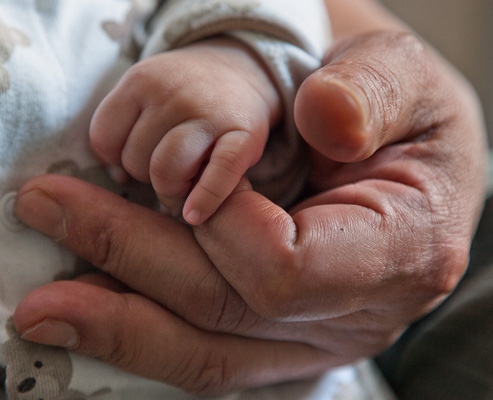
New beginnings Mok Moon-shing
Before I visited Mok Moon-shing in his new home in Shek Kip Mei Estate, my impression of him remained as it was three years ago: a man old before his time, mumbling to himself with his head down. But that was then. This time, the moment his wife opened the door to let me in and I saw the toys on the floor and the crayon etchings on the wall, I realised that the man standing before me no longer lived in shades of grey.
Like him, Shing’s second wife was a psychiatric patient. Four years ago, he was working as a patient care assistant at Queen Elizabeth Hospital. He met Ying one night while he was stationed at the accident and emergency department. “I was a patient care assistant, so when I saw a patient wandering around by herself, it was only right I showed some care, right?” he asked, laughing. Talking about how they met, Shing was uncharacteristically cheerful.
Ying was half his age. She had just moved out of the family home and started living on her own. She was having a hard time with her family, and Shing soon became a friend and counsellor. The two lonely souls soon became close. Today, they are married and have a son of their own. Until he met Ying, Shing had always been on his own. He kept a hamster for a time, and liked to watch it move around the cage.
Adjusting to a work environment is difficult for Shing, so he doesn’t hold any job for long. He has no stable job and few friends. He spent some time in rehabilitation, cut off from the outside world, and now finds it difficult to follow a social conversation.
Ying lives an even more closeted life; except for Shing and their son, she rarely meets other people. However, both husband and wife are wiling to brave the outside world for their son. “I don’t even say what I’m doing is to set an example for my son. As long as other people no longer see me as a walking bomb, I feel I’ve recovered.”
Shing fell ill 16 years ago when he was 40. Decades of hard work of trying to make ends meet took a toll on his health. His first marriage fell apart after he became sick. Looking back, he said, “I still can’t tell if it was a blessing in disguise, or plain misfortune.”
In some ways, his illness gave him a break from his busy and monotonous life. The respite seemed to have renewed his enthusiasm for life. Today, he’s a volunteer counsellor for psychiatric patients. Not only has he found himself a new family, but he also regularly visits his eldest son, who also suffers from a mental illness and lives in a rehabilitation facility. Shing is an active member of the SoCO concern group advocating for the rights of psychiatric patients.
Before I visited Mok Moon-shing in his new home in Shek Kip Mei Estate, my impression of him remained as it was three years ago: a man old before his time, mumbling to himself with his head down. But that was then. This time, the moment his wife opened the door to let me in and I saw the toys on the floor and the crayon etchings on the wall, I realised that the man standing before me no longer lived in shades of grey.
Like him, Shing’s second wife was a psychiatric patient. Four years ago, he was working as a patient care assistant at Queen Elizabeth Hospital. He met Ying one night while he was stationed at the accident and emergency department. “I was a patient care assistant, so when I saw a patient wandering around by herself, it was only right I showed some care, right?” he asked, laughing. Talking about how they met, Shing was uncharacteristically cheerful.
Ying was half his age. She had just moved out of the family home and started living on her own. She was having a hard time with her family, and Shing soon became a friend and counsellor. The two lonely souls soon became close. Today, they are married and have a son of their own. Until he met Ying, Shing had always been on his own. He kept a hamster for a time, and liked to watch it move around the cage.
Adjusting to a work environment is difficult for Shing, so he doesn’t hold any job for long. He has no stable job and few friends. He spent some time in rehabilitation, cut off from the outside world, and now finds it difficult to follow a social conversation.
Ying lives an even more closeted life; except for Shing and their son, she rarely meets other people. However, both husband and wife are wiling to brave the outside world for their son. “I don’t even say what I’m doing is to set an example for my son. As long as other people no longer see me as a walking bomb, I feel I’ve recovered.”
Shing fell ill 16 years ago when he was 40. Decades of hard work of trying to make ends meet took a toll on his health. His first marriage fell apart after he became sick. Looking back, he said, “I still can’t tell if it was a blessing in disguise, or plain misfortune.”
In some ways, his illness gave him a break from his busy and monotonous life. The respite seemed to have renewed his enthusiasm for life. Today, he’s a volunteer counsellor for psychiatric patients. Not only has he found himself a new family, but he also regularly visits his eldest son, who also suffers from a mental illness and lives in a rehabilitation facility. Shing is an active member of the SoCO concern group advocating for the rights of psychiatric patients.
莫滿成 禍兮福之所倚
到訪莫滿成位於石硤尾邨的新居前,我對他的印象,仍停留在三年多前,那個低着頭呢喃着自己早過着老人生活的這形象……直至他的妻子拉開家門,滿地的玩具,還有那面以蠟筆塗滿公仔的牆,均標示着一個活潑小生命的存在。眼前的阿成,已不再活在陰霾中。
阿成的第二任妻子同樣是精神病康復者。四年前,阿成在伊利沙伯醫院當二級病人服務助理,有一段時間被調到急症室守夜更。就在某一夜,他在急症室角落遇上了後來成為妻子的阿映。「我職責都係醫護人員嘛﹗我關心下病人喺度做咩,一個人流連係醫院,哈哈。」談到相識經過,阿成難得爽朗地笑道。
阿映年紀比他小一倍,那時剛搬離家人獨居,家庭關係鬧得不太愉快,阿成充當輔導的角色,兩顆寂寞的心互相依靠,兩人很快走在一起,未幾便誕下兒子。結識阿映前,阿成一直獨居,與他為伴的只有倉鼠,「喺個籠度,睇住佢郁下郁下咁解。」
阿成的病令他難以適應工作,每隔一段時間便辭工;沒有長工,朋友也不多。又因患病,曾有一段時間與世隔絕,社會上發生很多事他都記不起,也搭不上嘴。 妻子情況比他更糟,除了阿成和兒子,接觸外人的機會少之又少,不過夫妻倆卻願意為了兒子跨出家門,與外面的世界打交道。「唔好話教個仔吖,我係人心目中唔係一個炸彈,咁我已經係康復返架喇﹗」
阿成約十六年前發病,那時他40歲,數十年來為家庭奔波勞碌,熬出病來,落得妻離子散。驀然回首,他慨嘆「我都唔知係因禍得福,定係禍福。」病,讓他從營營役役中暫停。休息過後,他比過去的日子更積極。他以精神病過來人的身分成為輔導者,除了贏得妻兒,他還不時到療養院探望同樣患上精神病的長子,對外則參加精神病康復者權益關注組的活動,希望身體力行為其他病友爭取權益。
返回相片
到訪莫滿成位於石硤尾邨的新居前,我對他的印象,仍停留在三年多前,那個低着頭呢喃着自己早過着老人生活的這形象……直至他的妻子拉開家門,滿地的玩具,還有那面以蠟筆塗滿公仔的牆,均標示着一個活潑小生命的存在。眼前的阿成,已不再活在陰霾中。
阿成的第二任妻子同樣是精神病康復者。四年前,阿成在伊利沙伯醫院當二級病人服務助理,有一段時間被調到急症室守夜更。就在某一夜,他在急症室角落遇上了後來成為妻子的阿映。「我職責都係醫護人員嘛﹗我關心下病人喺度做咩,一個人流連係醫院,哈哈。」談到相識經過,阿成難得爽朗地笑道。
阿映年紀比他小一倍,那時剛搬離家人獨居,家庭關係鬧得不太愉快,阿成充當輔導的角色,兩顆寂寞的心互相依靠,兩人很快走在一起,未幾便誕下兒子。結識阿映前,阿成一直獨居,與他為伴的只有倉鼠,「喺個籠度,睇住佢郁下郁下咁解。」
阿成的病令他難以適應工作,每隔一段時間便辭工;沒有長工,朋友也不多。又因患病,曾有一段時間與世隔絕,社會上發生很多事他都記不起,也搭不上嘴。 妻子情況比他更糟,除了阿成和兒子,接觸外人的機會少之又少,不過夫妻倆卻願意為了兒子跨出家門,與外面的世界打交道。「唔好話教個仔吖,我係人心目中唔係一個炸彈,咁我已經係康復返架喇﹗」
阿成約十六年前發病,那時他40歲,數十年來為家庭奔波勞碌,熬出病來,落得妻離子散。驀然回首,他慨嘆「我都唔知係因禍得福,定係禍福。」病,讓他從營營役役中暫停。休息過後,他比過去的日子更積極。他以精神病過來人的身分成為輔導者,除了贏得妻兒,他還不時到療養院探望同樣患上精神病的長子,對外則參加精神病康復者權益關注組的活動,希望身體力行為其他病友爭取權益。